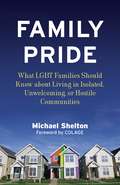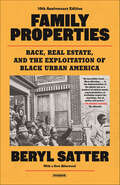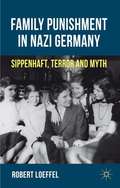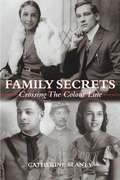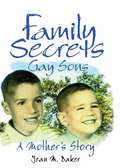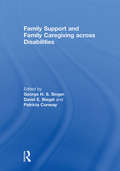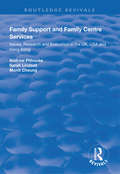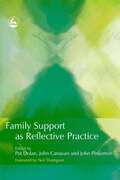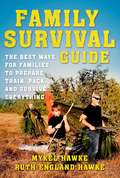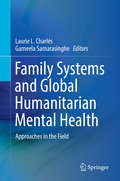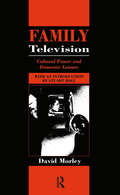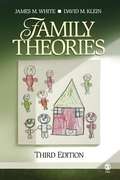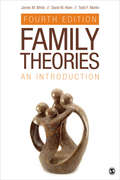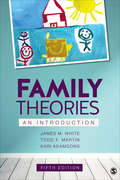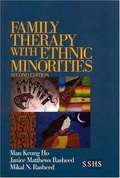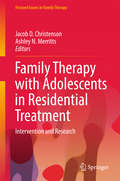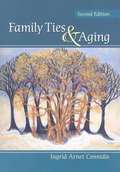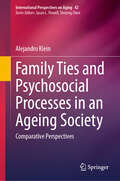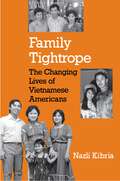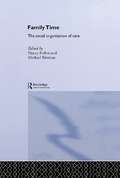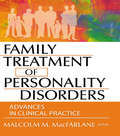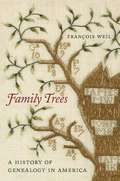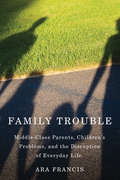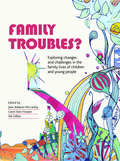- Table View
- List View
Family Pride: What LGBT Families Should Know about Navigating Home, School, and Safety in Their Neighborhoods (Queer Ideas/Queer Action #8)
by Michael Shelton Elizabeth CastellanaAn invaluable portrait and roadmap on how to thrive as an LGBT family The overwhelming success of Dan Savage's "It Gets Better" YouTube project aimed at queer youth highlighted that despite the progress made in gay rights, LGBT people are still at high risk of being victimized. While the national focus remains on the mistreatment of gay people in schools, the reality is that LGBT families also face hostility in various settings--professional, recreational, and social. This is especially evident in rural communities, where the majority of LGBT families live, isolated from support networks more commonly found in urban spaces. Family Pride is the first book for queer parents, families, and allies that emphasizes community safety. Drawing on his years as a dedicated community activist and on the experiences of LGBT parents, Michael Shelton offers concrete strategies that LGBT families can use to intervene in and resolve difficult community issues, teach their children resiliency skills, and find safe and respectful programs for their children.
Family Properties: Race, Real Estate, and the Exploitation of Black Urban America
by Beryl SatterPart family story and part urban history, a landmark investigation of segregation and urban decay in Chicago -- and cities across the nationThe "promised land" for thousands of Southern blacks, postwar Chicago quickly became the most segregated city in the North, the site of the nation's worst ghettos and the target of Martin Luther King Jr.'s first campaign beyond the South. In this powerful book, Beryl Satter identifies the true causes of the city's black slums and the ruin of urban neighborhoods throughout the country: not, as some have argued, black pathology, the culture of poverty, or white flight, but a widespread and institutionalized system of legal and financial exploitation. In Satter's riveting account of a city in crisis, unscrupulous lawyers, slumlords, and speculators are pitched against religious reformers, community organizers, and an impassioned attorney who launched a crusade against the profiteers—the author's father, Mark J. Satter. At the heart of the struggle stand the black migrants who, having left the South with its legacy of sharecropping, suddenly find themselves caught in a new kind of debt peonage. Satter shows the interlocking forces at work in their oppression: the discriminatory practices of the banking industry; the federal policies that created the country's shameful "dual housing market"; the economic anxieties that fueled white violence; and the tempting profits to be made by preying on the city's most vulnerable population. Family Properties: Race, Real Estate, and the Exploitation of Black Urban America is a monumental work of history, this tale of racism and real estate, politics and finance, will forever change our understanding of the forces that transformed urban America. "Gripping . . . This painstaking portrayal of the human costs of financial racism is the most important book yet written on the black freedom struggle in the urban North."—David Garrow, The Washington Post
Family Punishment in Nazi Germany
by Robert LoeffelIn the Third Reich, political dissidents were not the only ones liable to be punished for their crimes. Their parents, siblings and relatives also risked reprisals. This concept - known as Sippenhaft - was based in ideas of blood and purity. This definitive study surveys the threats, fears and infliction of this part of the Nazi system of terror.
Family Secrets: Crossing the Colour Line
by Catherine Slaney Daniel G. HillCatherine Slaney grew into womanhood unaware of her celebrated Black ancestors. An unanticipated meeting was to change her life. Her great-grandfather was Dr. Anderson Abbott, the first Canadian-born Black to graduate from medical school in Toronto in 1861. In Family Secrets Catherine Slaney narrates her journey along the trail of her family tree, back through the era of slavery and the plight of fugitive slaves, the Civil War, the Elgin settlement near Chatham, Ontario, and the Chicago years. Why did some of her family identify with the Black Community while others did not? What role did "passing" play? Personal anecdotes and excerpts from archival Abbott family papers enliven the historical context of this compelling account of a family dealing with an unknown past. A welcome addition to African-Canadian history, this moving and uplifting story demonstrates that understanding one’s identity requires first the embracing of the past. "When Catherine Slaney first consulted me, her intention was to research the life of her distinguished ancestor Anderson R. Abbott. After she told me her story of the discovery of her African heritage and the search for her roots, I urged her to make that the subject of her book. Cathy has served both of these objectives, giving us an intricate and fascinating account of her quest for her own lost identity through the gradual illumination of Dr. Abbott and his legacy for modern Canadians. Family Secrets carries an important message about the issue of ’race’ as a historical artifact and as a factor in the lives of real people."– James W. St. G. Walker, University of Waterloo "This is a welcome addition to the growing collection of African-Canadian materials that connects an unknown past to a promising future. That Slaney was unaware of her Black ancestry, despite that heritage being so rich and powerful, speaks to the dilemma of Black history research – it is there but requires considerable digging to uncover."– Rosemary Sadlier, President, Ontario Black History Society
Family Secrets: Gay Sons - A Mother's Story
by Jean M BakerAs a clinical psychologist, Jean Baker had always considered herself open-minded and tolerant, but found she wasn’t prepared for the revelation that her only two children were both gay. Family Secrets is an inspirational story of how she and her family learned to accept one another and overcome their internalized fears and prejudices as well as how they coped with a much greater challenge in their personal lives--HIV/AIDS. Family Secrets is more than a parenting memoir, however. It is a guide that draws upon research and scientific findings to capsize the myths and stereotypes that contribute to societal homophobia. It offers important insight into the developmental needs of gay children, and it discusses the issues faced by gay and lesbian youth and their families.Offering practical suggestions about how parents and schools can help gay, lesbian, and bisexual children grow up to be productive, psychologically healthy adults, Family Secrets discusses the effects of social prejudice and stigma on the social and emotional development of sexual minorities. As long as homophobia is running rampant in American society, gay children are going to be reluctant or afraid to confide in their parents, and parents will have trouble understanding and accepting homosexuality in their children. To end the secrecy and build open and healthy environments for all children and adolescents, this book discusses: tactics for reducing homophobia in non-gay youths promoting tolerance and understanding of sexual minorities at home and in school the effects an AIDS death has on families “coming out” about HIV/AIDS discussing homosexuality with your children, regardless of whether or not they are gay or lesbian sexual orientation and the interaction of biology with experienceBecause Family Secrets is written from the viewpoint of a parent/psychologist, it offers insights into the developmental needs of gay and lesbian children in a way that no other book has done. School counselors, psychologists, marriage and family counselors, teachers, school administrators, and the parents and siblings of gays and lesbians will all benefit from reading this honest, helpful, and encouraging book.
Family Support and Family Caregiving across Disabilities
by George H. S. Singer David E. Biegel Patricia ConwayFamily members provide the majority of care for individuals with disabilities in the United States. Recognition is growing that family caregiving deserves and may require societal support, and evidence-based practices have been established for reducing stress associated with caregiving. Despite the substantial research literature on family support that has developed, researchers, advocates and professionals have often worked in separate categorical domains such as family support for caregiving for the frail elderly, for individuals with mental illness, or for people with development disabilities. Family Support and Family Caregiving across Disabilities addresses this significant limitation through cross-categorical and lifespan analyses of family support and family caregiving from the perspectives of theory and conceptual frameworks, empirical research, and frameworks and recommendations for improvements in public policy. The book also examines children with disabilities, children with autism, adults with schizophrenia, and individuals with cancer across the life cycle. This book was published as a two-part special issue in the Journal of Family Social Work.
Family Support and Family Centre Services: Issues, Research and Evaluation in the UK, USA and Hong Kong (Routledge Revivals)
by Andrew Pithouse Sarah Lindsell Monit CheungPublished in 1998, the aim of this book is to identify and explore key themes and issues around the realm of welfare practice in child and family social work - that is, family centre services and related community-based types of provision. The text addresses the impact and effectiveness of family centres in supporting children, families and communities. Emphasis is placed on community based supportive/preventive family services and those that provide a closed access and therapeutic service aimed at families referred by social workers where children are at risk of abuse. Throughout, the focus is on best practice exemplified by research findings of family centre impacts and outcomes in the UK, the USA and Hong Kong.
Family Support as Reflective Practice
by John Pinkerton Neil Thompson Pat Dolan John CanavanFamily support is an increasingly important strategic approach to welfare services for children and families. This invaluable resource for all professionals engaged in the development and delivery of these services is underpinned by reflective practice values and structured around four themes: * conceptual frameworks and vocabulary (defining) * policy and organisational structures and processing (planning) * tools for creative practice (doing) * approaches to evaluation (measuring). Contributors from around the world provide international perspectives on core issues in family support. These include the importance of community, the role of statutory and voluntary agencies, youth advocacy, culturally appropriate family support, child protection, disability services and effective means of evaluation. Providing a combination of clear theoretical frameworks and practical guidance, with clear 'how to' messages and a strong emphasis on evaluation, this book will be of interest to social workers, care staff, teachers, community development and police officers, students, policy-makers, evaluators and all those working in all areas of family support.
Family Survival Guide: The Best Ways for Families to Prepare, Train, Pack, and Survive Everything
by Mykel Hawke Ruth England HawkeAre you prepared in case disaster strikes? Are your kids? In the Family Survival Guide, veteran adventurers Mykel and Ruth Hawke provide the vital information you and your family need to get through almost any disaster safely. The topics covered are wide-ranging and easy-to-follow. Here, you and your family will learn: How to find, purify, and store water How to construct different types of shelter and the perfect places to build them What to pack and what not to pack in a bugout bag Essential first aid skills How to navigate your way when lost How to build a fire Basic foraging, hunting and outdoor cooking skills And so much more! Filled with expert advice and time-tested tips, Family Survival Guide is an essential handbook
Family Systems and Global Humanitarian Mental Health: Approaches in the Field
by Laurie L. Charlés Gameela SamarasingheThis powerful reference explores the processes and practices of family systems therapy as conducted in humanitarian situations across the globe. It follows the editors’ previous volume Family Therapy in Global Humanitarian Contexts: Voices and Issues from the Field in defining systemic therapy as multidisciplinary, portable, and universal, regardless of how far from traditional clinical settings it is applied. Chapters from diverse locales document remarkable examples of courage and resilience on the part of therapists as well as clients in the face of war, unjust policies, extreme inequities, and natural disasters. Contributors describe choosing and implementing interventions to fit both complex immediate challenges and their local contexts as they work to provide systemic family and public mental health services, including:Assisting families of missing persons in CyprusEmergency counseling after a Florida school shooting Therapeutic metaphors in a Lebanese refugee campSessions with separated family members on the U.S./Mexico borderAddressing healthcare disparities in the CaribbeanTraining family therapists in Sri LankaFamily and community support during the Ebola epidemic in GuineaProviding systemically oriented therapy and supervision in high-conflict countriesRisk assessment using emerging media in Chilean communitiesFamily Systems and Global Humanitarian Mental Health: Approaches in the Field is a valuable resource for professionals in both the global North and South, including family therapists, psychologists, psychiatrists, nurses and public health professionals, and mental health and psychosocial support providers working in humanitarian settings.
Family Television: Cultural Power and Domestic Leisure (Comedia)
by David MorleyFirst Published in 2006. Routledge is an imprint of Taylor & Francis, an informa company.
Family Theories (Third Edition)
by James M. White David M. KleinBuilding upon the success of two previous bestselling editions, the Third Edition of Family Theories continues to be the ideal resource for readers wishing to develop an understanding of sophisticated ideas about families and marriages. Authors James White and David Klein have updated and revised each chapter based on readers’ suggestions and on developments in the area of family sociology and family studies. An incisive, thorough introduction to current and traditional theories of the family, this text balances the diversity and richness of a broad scope of scholarly work. New to the Third Edition Starts with a reorganized introductory chapter: The opening chapter has been restructured for increased clarity and to offer a better guide to utilizing theory to guide research and practice. Introduces a new chapter: Previous editions included seven major theoretical frameworks to explain variation in family life. The Third Edition welcomes the addition of an eighth framework on functionalist theory. Includes material on postmodernism: By placing information on postmodernism within the chapter on the feminist framework, the authors allow readers to see more clearly how these two intellectual movements relate to the study of families. Offers updates throughout: Significant additions to the “Variations” section of all chapters have been made to capture new theoretical developments. Restores several meta-theories: Deleted from the last chapter in the previous edition, several meta-theories, dealing with the type of causation, treatment of time, and the level of analysis, have been added back in this new edition. Intended Audience This text is designed for advanced undergraduate and graduate courses such as Family Theories, Family Systems & Theory, and Sociology of the Family in departments of family studies, sociology, and human development
Family Theories: An Introduction
by David M. Klein Dr James M. White Todd F. MartinThe Fourth Edition of James M. White, David M. Klein, and Todd F. Martin's best-selling Family Theories: An Introduction offers a thorough and accessible approach to the most current perspectives in family theory. Rich in detail yet exceptionally concise, the text's analytical structure draws from such major theoretical frameworks as social exchange and choice, symbolic-interaction, family life course development, systems, conflict, feminism, and ecology to explain variation in families. Thoroughly updated, this new edition helps readers connect theory to everyday life.
Family Theories: An Introduction
by James M. White Todd F. Martin Kari AdamsonsFamily Theories: An Introduction by James M. White, Todd F. Martin, and new co-author Kari Adamsons provides an incisive, thorough primer to current theories of the family that balances the diversity and richness of a broad scope of scholarly work in a concise manner. This best-selling text draws upon eight major theoretical frameworks developed by key social scientists to explain variation in family life. These frameworks include social exchange and choice, symbolic-interaction, family life course development, systems, conflict, feminist, ecological, and functional theories. This new Fifth Edition includes suggestions for integrating theory to guide a research program and more applications for those going on to careers in the helping professions. With an increased focus on both classical theories as well as contemporary and emerging theories, this text challenges students to think about how families and family theories have changed over the last 70 years as well as where family scholarship is headed.
Family Theories: An Introduction
by James M. White Todd F. Martin Kari AdamsonsFamily Theories: An Introduction by James M. White, Todd F. Martin, and new co-author Kari Adamsons provides an incisive, thorough primer to current theories of the family that balances the diversity and richness of a broad scope of scholarly work in a concise manner. This best-selling text draws upon eight major theoretical frameworks developed by key social scientists to explain variation in family life. These frameworks include social exchange and choice, symbolic-interaction, family life course development, systems, conflict, feminist, ecological, and functional theories. This new Fifth Edition includes suggestions for integrating theory to guide a research program and more applications for those going on to careers in the helping professions. With an increased focus on both classical theories as well as contemporary and emerging theories, this text challenges students to think about how families and family theories have changed over the last 70 years as well as where family scholarship is headed.
Family Therapy With Ethnic Minorities (Second Edition)
by Mikal N. Rasheed Janice Matthews Rasheed Man Keung HoPraise for First Edtion `There are many good things about the perspective taken in this book. . . an ambitious and creative effort. Provides a starting point on the road to building an alternative therapeutic approach that is sensitive to cultural diversity. It makes an important initial contribution to systemizing knowledge for family therapy so that it is culturally and ethnically specific' - Journal of Marriage and the Family The classic and critically acclaimed book Family Therapy with Ethnic Minorities, Second Edition has now been updated and revised to reflect the various demographic changes that have occurred in the lives of ethnic minority families and the implications of these changes for clinical practice. Family Therapy with Ethnic Minorities provides advanced students and practitioners with the most up-to-date examination yet of the theory, models, and techniques relevant to ethnic minority family functioning and therapy. After an introductory discussion of principles to be considered in practice with ethnic minorities, the authors apply these principles to working with specific ethnic minority groups, namely African Americans, Latinos, Asian/Pacific Americans, and First Nations People. Distinctive cultural values of each ethnic group are explored as well as specific guidelines and suggestions on culturally significant family therapy strategies and skills.
Family Therapy with Adolescents in Residential Treatment: Intervention and Research (Focused Issues in Family Therapy)
by Jacob D. Christenson Ashley N. MerrittsThis highly practical resource integrates the powerful dynamics of family into residential treatment and outdoors-based therapy for young people. Recognizing both the family as the systemic base for promoting change in adolescents and the therapeutic potential of the residential/wilderness setting, experts show how aligning the two can enhance the healing value of the program while promoting higher standards for care. Chapters describe innovative, science-based interventions and techniques for treating common behavioral and emotional problems along a continuum of family involvement and separation, to address issues affecting the family as well as the identified patient. With its accessible ideas and compelling case studies, the book ably demonstrates the critical role of family in adolescent patients’ successful transition to post-treatment life. Among the topics covered:• A parallel process: home therapy while the adolescent or young adult is in residential care.• Intentional separation of families: increasing differentiation through wilderness therapy.• Emerging family therapy models utilized in residential settings.• Engaging families in Outdoor Behavioral Healthcare.• Research on coping skills used by youth with emotional and behavioral disorders.• Expanding our understanding of the place of family therapy in residential treatment.Family Therapy with Adolescents in Residential Treatment offers novel, exciting, and effective strategies and techniques for practitioners and mental health professionals particularly interested in family therapy with adolescents, and in related interventions and research.
Family Ties and Aging (2nd Edition)
by Ingrid Arnet ConnidisThis textbook covers issues of family ties and aging broadly to provide an integrated and thorough representation of what we know from the current research. The text includes groups and relationships exploring such neglected populations as single, divorced, and childless older people and their family relationships, sibling relationships among the elderly, live-in partnerships not formalized by marriage, and the kinds of family ties forged by gay and lesbian persons over the life course.
Family Ties and Psychosocial Processes in an Ageing Society: Comparative Perspectives (International Perspectives on Aging #42)
by Alejandro KleinThis book contributes to the discussion on the ageing society by addressing the new psycho-social structures of the ageing society, the problems around family bonds and ties, and the structures of care and protection. The book sheds light on the new roles of grandparents and new grandparents, and the empowerment and resilience initiatives, thereby providing a broad discussion of what the ageing society implies in psychosocial terms. These issues are addressed in an interdisciplinary way, but also in an approach that is also rare, comparing different realities between Europe and Latin America. The [basis of the] English translation of this book from its Spanish original manuscript was done with the help of artificial intelligence. A subsequent human revision of the content was done by the author.
Family Tightrope: The Changing Lives of Vietnamese Americans
by Nazli KibriaIn recent years the popular media have described Vietnamese Americans as the quintessential American immigrant success story, attributing their accomplishments to the values they learn in the traditional, stable, hierarchical confines of their family. Questioning the accuracy of such family portrayals, Nazli Kibria draws on in-depth interviews and participant observation with Vietnamese immigrants in Philadelphia to show how they construct their family lives in response to the social and economic challenges posed by migration and resettlement. To a surprising extent, the "traditional" family unit rarely exists, and its hierarchical organization has been greatly altered.
Family Time: The Social Organization of Care (Routledge Iaffe Advances In Feminist Economics Ser. #Vol. 2)
by Nancy Folbre Michael BittmanThe time we have to care for one another, especially for our children and our elderly, is more precious to us than anything else in the world. Yet we have more experience accounting for money than we do for time. In this volume, leading experts in analysis of time use from across the globe explore the interface between time use and family pol
Family Treatment of Personality Disorders: Advances in Clinical Practice
by Malcolm M. MacFarlaneHelp families cope with the impact of personality dysfunction! Family Treatment of Personality Disorders: Advances in Clinical Practice examines the application of marital and family therapy approaches to the treatment of a wide range of personality disorders. Valuable on its own and doubly useful as a companion volume to Family Therapy and Mental Health: Innovations in Theory and Practice (Haworth), the book integrates traditional individual models with family systems models to provide a multidimensional approach to treating personality disorders. Each chapter is written by a family therapist with extensive experience treating personality disorders and includes a case example, an exploration of the impact of the disorder on family members, a look at cultural and gender issues, and an examination of how the model is integrated with traditional psychiatric services and the proper application of medication. Family Treatment of Personality Disorders is a single, accessible source for significant contributions to the emerging literature on family treatment approaches that, until now, have been scattered through journals representing a variety of disciplines. The book&’s strong clinical focus provides a concise summary of relevant theory and interventions for effective treatment, including discussion of how to manage crises and acting out behavior. Edited by a practicing frontline clinician, the book provides an overview of the personality disorders field, examines the Structural Analysis of Social Behavior model and the Interpersonal Reconstructive Therapy approach, and presents detailed descriptions of key concepts and treatment approaches. Family Treatment of Personality Disorders focuses on specific DSM-IV personality disorders, including: borderline narcissistic histrionic obsessive-compulsive passive-aggressive avoidant dependent paranoid Family Treatment of Personality Disorders: Advances in Clinical Practice is an excellent resource for clinicians treating mental health problems and for academic work in family psychopathology and family therapy and mental health.
Family Trees
by Francois WeilThe quest for roots has been an enduring American preoccupation. Over the centuries, generations have sketched coats of arms, embroidered family trees, established local genealogical societies, and carefully filled in the blanks in their bibles, all in pursuit of self-knowledge and status through kinship ties. This long and varied history of Americans' search for identity illuminates the story of America itself, according to François Weil, as fixations with social standing, racial purity, and national belonging gave way in the twentieth century to an embrace of diverse ethnicity and heritage. Seeking out one's ancestors was a genteel pursuit in the colonial era, when an aristocratic pedigree secured a place in the British Atlantic empire. Genealogy developed into a middle-class diversion in the young republic. But over the next century, knowledge of one's family background came to represent a quasi-scientific defense of elite "Anglo-Saxons" in a nation transformed by immigration and the emancipation of slaves. By the mid-twentieth century, when a new enthusiasm for cultural diversity took hold, the practice of tracing one's family tree had become thoroughly democratized and commercialized. Today, Ancestry. com attracts over two million members with census records and ship manifests, while popular television shows depict celebrities exploring archives and submitting to DNA testing to learn the stories of their forebears. Further advances in genetics promise new insights as Americans continue their restless pursuit of past and place in an ever-changing world.
Family Trouble
by Ara FrancisOur children mean the world to us. They are so central to our hopes and dreams that we will do almost anything to keep them healthy, happy, and safe. What happens, then, when a child has serious problems? In Family Trouble, a compelling portrait of upheaval in family life, sociologist Ara Francis tells the stories of middle-class men and women whose children face significant medical, psychological, and social challenges. Francis interviewed the mothers and fathers of children with such problems as depression, bi-polar disorder, autism, learning disabilities, drug addiction, alcoholism, fetal alcohol syndrome, and cerebral palsy. Children's problems, she finds, profoundly upset the foundations of parents' everyday lives, overturning taken-for-granted expectations, daily routines, and personal relationships. Indeed, these problems initiated a chain of disruption that moved through parents' lives in domino-like fashion, culminating in a crisis characterized by uncertainty, loneliness, guilt, grief, and anxiety. Francis looks at how mothers and fathers often differ in their interpretation of a child's condition, discusses the gendered nature of child rearing, and describes how parents struggle to find effective treatments and to successfully navigate medical and educational bureaucracies. But above all, Family Trouble examines how children's problems disrupt middle-class dreams of the "normal" family. It captures how children's problems "radiate" and spill over into other areas of parents' lives, wreaking havoc even on their identities, leading them to reevaluate deeply held assumptions about their own sense of self and what it means to achieve the good life. Engagingly written, Family Trouble offers insight to professionals and solace to parents. The book offers a clear message to anyone in the throes of family trouble: you are in good company, and you are not as different as you might feel...
Family Troubles?: Exploring Changes and Challenges in the Family Lives of Children and Young People
by Jane Ribbens McCarthy ; Carol-Ann Hooper ; Val GilliesAs the everyday family lives of children and young people come to be increasingly defined as matters of public policy and concern, it is important to raise the question of how we can understand the contested terrain between “normal” family troubles and troubled and troubling families. In this important, timely and thought-provoking publication, a wide range of contributors explore how “troubles” feature in “normal” families, and how the “normal” features in “troubled” families. Drawing on research on a wide range of substantive topics - including infant care, sibling conflict, divorce, disability, illness, migration and asylum-seeking, substance misuse, violence, kinship care, and forced marriage - the contributors aim to promote dialogue between researchers addressing mainstream family change and diversity in everyday lives, and those specialising in specific problems which prompt professional interventions. In tackling these contentious and difficult issues across a variety of topics, the book addresses a wide audience, including policy makers, service users and practitioners, as well as family studies scholars more generally who are interested in issues of family change.
